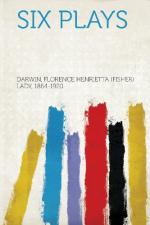[Isabel has been slowly approaching, she wears a cotton handkerchief over her head and carries a small bundle tied up in a cloth on her arm. Her movements are languid and sad.
Mary. I know of flowers that can heal even the pains of love.
Isabel. [Coming forward and speaking earnestly.] O tell me of them quickly, mistress.
Mary. Why, are you sick of the same complaint?
Isabel. [Sinking down on the grass at Mary’s feet.] So bruised and wounded in the heart that the road from Framilode up here might well have been a hundred miles or more.
Lubin. Framilode? ’Tis there you come from?
Isabel. I was servant at the inn down yonder.
Close upon the ferry.
Do you know the place, master?
Lubin. [In deep gloom.] Ah, the place and the ferry man too.
Mary. [Leaning forward and clasping her hands.] Him as is there to-day, or him who was?
Lubin. He who was there and left for foreign parts a good three year ago.
[Isabel covers her face and is shaken by sobs. Lubin leans his elbow on his knee, shading his eyes with his hand.
Mary. I have help for all torments in my flowers. Such things be given us for that.
Isabel. [Looking up.] You be gentle in your voices mistress. ’Tis like when a quist do sing, as you speaks.
Mary. Then do both of you tell your sorrow. ’Twill be strange if I do not find sommat that will lighten your burdens for you.
Lubin. ’Twas at Moat Farm I was born and bred.
Mary. Close up to Daniels yonder?
Lubin. The same. Rose-Anna of the Mill and I—we courted and was like to marry. But there came misfortune and I lost my all. She would not take a poor man, so I left these parts and got to be what you do see me now—just a day labourer.
Isabel. Mine, ’tis the same tale, very nigh. Robert the ferry-man and me, we loved and was to have got us wedded, only there came a powerful rich gentleman what used to go fishing along of Robert. ’Twas he that ’ticed my lover off to foreign parts.
Lubin. [With a heavy sigh.] These things are almost more than I can bear.
Isabel. At first he wrote his letters very often. Then ’twas seldom like. Then ’twas never. And then there comed a day—[She is interrupted by her weeping.
Mary. Try to get out your story—you can let the tears run afterwards if you have a mind.
Isabel. There comed a day when I did meet a fisherman from Bristol. He brought me news of Robert back from the seas, clothed in fine stuff with money in the pockets of him, horse and carriage, and just about to wed.
Lubin. Did he name the maid?
Isabel. Rose-Anna she was called, of Daniel’s mill up yonder.




